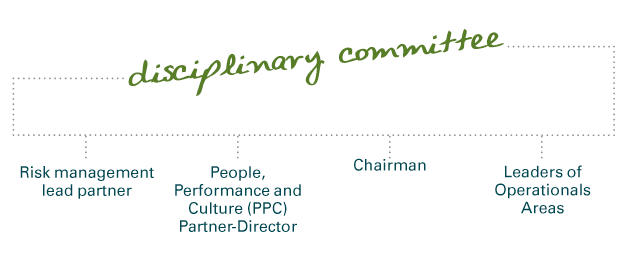Governance at KPMG in Brazil
GRI 4.9
Our local governance structure follows the global standards established by KPMG International and has its own additional bodies for management coordination and oversight, in compliance with Brazilian law. The chairman at KPMG in Brazil is the principal local executive and is elected by the other partners for a term of three years, renewable for a further two mandates of the same period. With this limitation, we promote leadership rotations and encourage various partners to join senior management, maintaining our succession process. GRI 4.2
As part of the career development process, professionals showing outstanding performance become partners of the Organization and can apply as candidates for chairmanship, provided they meet the requirements established in applicable regulations.
Governance at KPMG in Brazil
The chairman is responsible for appointing the Executive Committee, which comprises the Chairman and seven other partners, usually heads of the main business practices so that all are represented. The Management department – which comprises Corporate Citizenship, Marketing, People, Performance & Culture, Training & Development, Controllership, Financial, Facilities and Information Technology – is led by the Chief Operating Officer (CEO).
In Brazil, sustainability performance is assessed in two spheres by Corporate Citizenship, which reports directly to the Chief Operating Officer - COO:
Strategic sphere: monitoring performance against the goals and policies adopted globally and locally.
Operational sphere: this includes submittal of annual action plans and projects to the COO and the chairman of the Executive Committee, as well as quarterly meetings with the COO to report on progress on actions.
In addition, members of the Executive Committee are involved in the initial interviews for preparing our sustainability report, and also in reviewing it, which is when our results are presented in a more systematic manner.
Together, the chairman and the Executive Committee are responsible for policy, planning, supervision and general management of activities, including defining goals for local growth and determining the strategic management of business areas, ensuring consistency with global strategy.
The members of the Executive Committee meet on a monthly basis and, as leaders of their practices, continue to exercise their responsibilities for the provision of services to clients. Because it consists of partners who continue to perform their professional activities, the Executive Committee does not include any independent members. GRI 4.3
This organizational structure favors dialog between leaders and other partners and professionals, ensuring all areas are represented at the Organization's primary decision making bodies. All partners are called to quarterly meetings to report on results and for strategic alignment. In addition, all partners attend statutory annual meetings to approve reports and discuss other subjects related to the business. We also organize periodic business group meetings through bodies such as the Women's Committee and the PLL Committee (read more in People). GRI 4.4
KPMG in Brazil's governance structure also includes an Operational Committee, consisting of operational department leads and the Markets lead, which manages routine business in accordance with the goals established in the strategic plan; as well as a Finance Committee, which is responsible for the Organization's investments; and a Compensation Committee, which deals with the rules for remunerating partners and partner-directors.
Another essential body for our governance structure is the Disciplinary Committee, presented in Professionalism and Integrity, which investigates suspected violations of rules and policies by any of our professionals, including partners. This committee comprises practice leads, Human Resources, Performance and Culture Directors, the Risk Management partner and the chairman. GRI 4.6
All of these governance practices, based on globally adopted standards, strengthen our brand and reputation and help us uphold the standards of quality for which we want to be recognized in all markets we serve.


